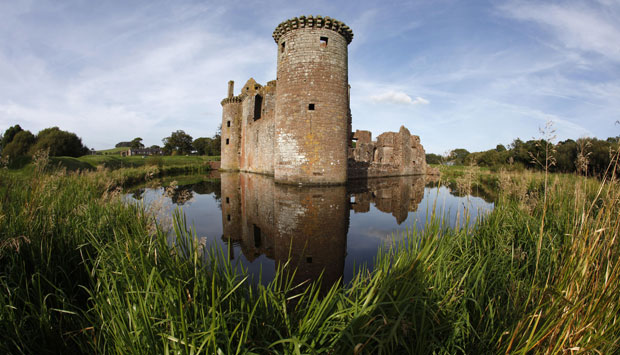Juliana Jumps April 8, 2013
Author: Beach Combing | in : Medieval , trackbackIn 1119, a woman jumped off a castle wall, in Normandy, and, against the odds, escaped from her father who intended to kill her. However, before we get to this noble’s life-saving acrobatics some background and be warned as most things to do with the Normans it is complicated and bloody. Juliana of Fontevrault was the illegimitate daughter of Henry I, King of England. Juliana had a serious grudge against her father because he had handed over her two daughters (his grand-daughters) to be mutilated by the archenemy of Juliana and her husband Eustace, the terrible Ralph Harenc: rotten Ralph blinded then clipped the noses of these girls, who were not older than twelve and who may have been a good deal younger. This does not, of course, reflect well on Ralph or for that matter on Henry: but we should not forget that Eustace and Juliana had out-vile-jellied Ralph’s son (they’d popped his eyes), who had also been a hostage. In any case, Henry’s decision sent Eustace and Juliana into full-blooded furious rebellion and raised half of Normandy against the King of England, the ruler of Normandy at this date. The episode below is not just an exciting in terms of drama and gymnastics it is also one of those what-if moments in English and Norman history as Henry has a brush with mortality. Henry I has occupied the town of Breteuil, but Juliana is still safe in the castle at the centre of the town: memories, at least for Beach, of Catherine Sforza exposing herself on the battlements of Ravaldino.
Juliana was now extremely anxious and unsure what to do. She was certain that her father, knowing the situation, had arrived in a rage against her and would not raise the siege now in place around the castle until he had triumphed. Nevertheless, as Solomon says, ‘There is no wickedness like a woman’s wickedness,’ and in the end, plotting to raise her hand against the Lord’s anointed, she treacherously asked to speak to her father. The king, ignorant of the woman’s trick, came to meet with her, while his accursed child hoped to murder him. She had a cross-bow already cocked and shot a bolt at her father, but God protected him and she missed.
How different English history would have been if sour Henry (obit 1135) had died in 1119? But we digress. For present purposes it is enough to note that Juliana must have been furious with her father to have tried that trick. It shows, in any case, that she was playing for keeps and that her daughter’s bleeding faces were very much in mind. The next passage is a fascinating one and we have to read between the lines here as the author Oderic Vitalis is clearly not a partisan of wild Juliana.
The king immediately ordered that the castle drawbridge be destroyed, so that no one could enter or leave. Juliana, seeing that she was completely surrounded and that no one was going to help her, surrendered the castle to the king, but could could not persuade him to allow her free departure. Indeed by the king’s order she was forced to leap down from the top of the wall, with no bridge or support, and fell ignominiously, with bare buttocks, into the depths of the moat. This happened at the beginning of Lent, in the third week of February, when the castle moat was full to overflowing with winter rains, and the frozen waters naturally struck numbing cold into the tender flesh of the fallen woman. The unlucky female warrior shamefully extracted herself from the predicament as best she could and, withdrawing to her husband who was then at Pacy, gave him a realistic account of her unpleasant experience.
Oderic tries to make this into a comedy turn: nasty noble woman churns up some mud in the moat. But Henry would never have let Juliana go willingly either through the castle gate or from its wall. He may well have wanted to have murder her with a crossbow bolt… Instead, with the guts that characterized her bloodline, Juliana leapt from the heights into the moat: the winter waters will have been welcome if the fall was a long one, and then somehow escaped to her husband at Pacy. The easiest explanation would be that Juliana had a loyalist on hand with a couple of horses. Other daring medieval warrior women? drbeachcombing AT yahoo DOT com



